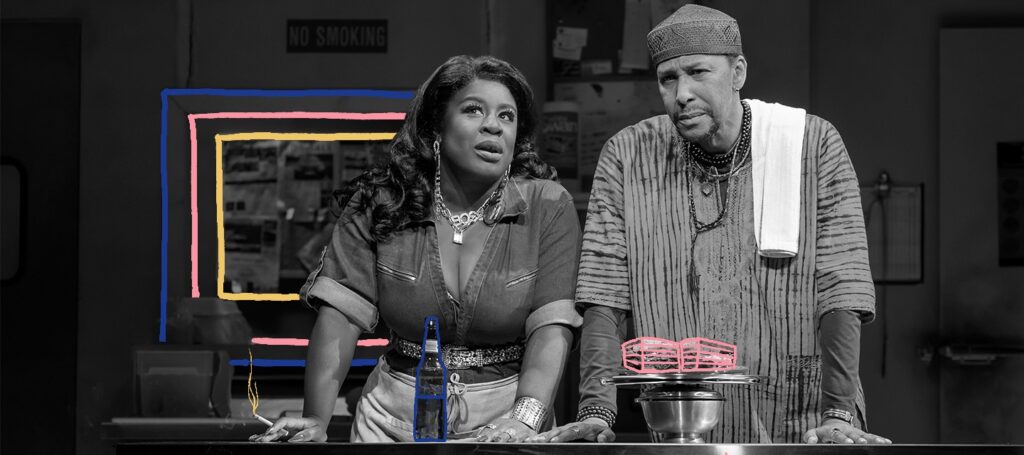


The Socially Conscious ‘Clyde’s’ is a Trope-Busting Masterpiece
Lynn Nottage has returned to Broadway with the ultimate flex: Clyde’s; a gut-busting comedy that leans into the sophisticated, yet populist, perspectives that she investigated through her previous play―the Pulitzer Prize-winning Sweat―that doubles as a multi-genre encompassing masterpiece loaded with more layers than a metatextual onion.
On its surface, Clyde’s, which just opened at the Hayes Theater, is about a group of former convicts trying to create the ultimate sandwich while earning their daily bread in a shop bearing the name of the play’s titular tyrant (Uzo Aduba). That Clyde is the only person willing to hire her four pawns―despite the fact that they have already paid their debt to society―makes them particularly vulnerable to her abusive ways.
Beneath that simple plot, one sees that Nottage is using the play to unearth how elevated the stakes are when one has no chance of redemption―as is the case for many people with prison records in this country.
Indeed, according to the U.S. Sentencing Commission’s 2019 report on recidivism, 40% of people who have been convicted of nonviolent offenses will be arrested again within eight years of release. The reason why is that society allows former prisoners to remain enslaved within the maw of second-class citizenship and employment discrimination. Case in point, in 2018, the non-partisan, non-profit Prison Policy Initiative found that 27% of formerly incarcerated people within the U.S. were unemployed at any given point in time versus the 25% high for the general population that occurred in 1933―during The Great Depression.
Without a job, how can such individuals function within a capitalist system that gleefully preys upon their vulnerability?
Nottage illustrates this unfair reality early in Clyde’s when Letitia (Kara Walker)―the single mother of a daughter with epilepsy, who lives paycheck to paycheck―arrives late for work after her childcare option falls through. Letitia is forced to swallow the horrific bullying that ensues because she knows that if she stands up for herself, Clyde will fire her. Letitia and her kitchen mate Rafael (Reza Jones) internalize this abuse by attempting to pass it onto the newcomer Jason (Edmund Donavan), whom they terrorize with tales of the boss lady’s capricious cruelty.
Despite their focus on Clyde’s sadism, it is clear that what frightens the rowdy bunch most is the ever-present (and demonstrated upon Jason) threat that she can physically and sexually assault them with impunity, as well as her reminders that she might terminate their employment, and report false, though damning, intel to their parole officers without fear of repercussions.
Something has to give under such excrutiating torture. In this instance, it is the hard-fought-for dignity that these characters have attempted to reassemble. What keeps the crew from falling entirely into depravity is the mentorship provided by their colleague Montrellous (Ron Cephas Jones), whose lessons in creating the perfect meal, a sandwich, serve as edification.
Despite his zen mindset, Montrellous is constantly at odds with Clyde who rebuffs his attempts to show her kindness or to redeem her servants. She’d rather they devolve from slaves into vicious overseers, much like herself.
Buried between these scenes of ever-shifting power dynamics, Nottage has embedded an additional metatextual layer concerning free will. In her notes about the setting, she describes Clyde’s location as a sandwich shop, somewhere in Berks County, Pennsylvania as well as a liminal space. Without giving away too many spoilers, anyone who is caught up on their Catholic catechism will understand the potential cost of being trapped within that ambivalence.
It should be noted that the play’s setting is also a tip of the hat that the Jason who appears in this show in the same Jason, white supremacy prison tattoos and all, from Sweat.
Though the show bears her name, Clyde functions as more a supporting guest star who graces the kitchen solely to upset its inhabitants. And bedecked in her glammed up sex-armor and blown-out hair, Aduba bites into her sinister ways with hilarious relish. Beyond working her staff to the bone while hurling invective, she also elevates being disagreeable to the level of high art.
If there is an option to behave reasonably, Clyde will go out of her way to deliver harm, even if it affects the bottom line, as she does after the restaurant is recognized with a glowing review in the local paper. Rather than invest in Montrellous’ subsequent desire to revamp the menu and create a pathway towards prosperity for the team, Clyde makes clear that she is eager to keep the staff groveling on all fours.
In Aduba’s hands, what could register as a one-note parody of a recently disgraced Broadway theatre producer becomes a woman so scarred by her trauma that all she can do is spew violence on those around her, lest they usurp her throne. One might say that Clyde even hopes that her peons will break down and return to prison.
Relief arrives during a moment of transcendence―wherein the characters decide that when one has nothing else to lose, getting out is always an option. Watching the show’s core squad arrive at that epiphany transports Clyde’s beyond comedy, documentary theatre, and social commentary into the realm of masterpiece theatre that is accessible to all.
On the production side, Nottage’s frequent collaborator, director Kate Whoriskey, keeps the show blazing along at a brisk clip without getting tripped up by its rich details. She is ably assisted by Christopher Akerlind’s evocative lighting and Takeshi Kata’s uber-functional set, as well as the incredible cast who use their character-informed antics to develop a delicious stew of communal rapport. Watching them bite, or twerk, into the material, one comes to recognize these characters as our uncles, brothers, sisters, lovers, and friends―fellow citizens who have as much claim to the “American Dream” as we do, despite their flaws.
Thank goodness then that it has been announced that Second Stage will live-stream the show’s final 16 performances so that audiences across the nation can devour its succulent wonders. More than any piece of theatre that has premiered on Broadway in the past few decades, Clyde’s could possibly transform the way that viewers regard their reformed brethren and demand that necessary reforms be passed to allow them to reintegrate into society. Until that time, I’m returning for an in-person encore viewing―Clyde’s is quite simply, that tantalizingly piquant.
Keep Reading

At ‘Trouble in Mind’, School is in Session
When you hear “revival of a play” you’ll most likely imagine one of the countless Broadway productions of Mamet, O’Neill, or Williams featuring a celebrity. Roundabout’s production of Trouble in Mind certainly is not that. Strictly speaking, it’s not even a revival; a pre-show announcement informs the audience, “Alice Childress’ Trouble in Mind premiered off-Broadway […]
Read More
‘Diana’: A Princess Pop Musical Gone Wrong
During a time in which we’ve seen an explosion of content driven by an interest in the British Royal Family, you might expect Diana, to come off as the long-lost sibling to Peter Morgan’s The Crown or Pablo Lorrain’s new film Spencer. Instead, this new production (which is also streaming alongside The Crown on Netflix) […]
Read More












